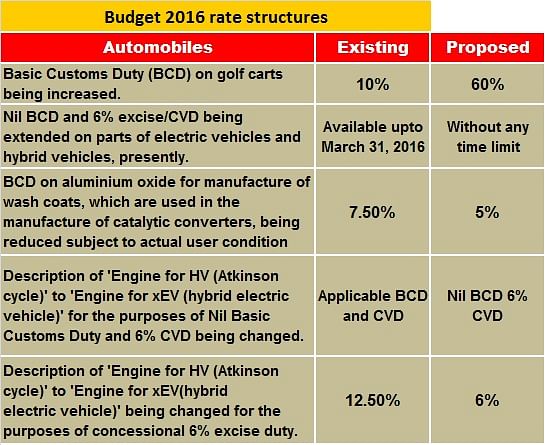Budget 2016-17 taxes PV industry, spares 2- & 3-wheelers
If the Indian auto industry, more so the passenger car sector, was looking hopefully at the Budget to give a fillip to sales, it did not contend with finance minister Arun Jaitley’s Union Budget 2016-17.
If the Indian auto industry, more so the passenger car sector, was looking hopefully at the Budget to give a fillip to sales in the upcoming fiscal year 2016-17, it did not contend with finance minister Arun Jaitley’s Union Budget 2016-17.
The Budget, the third one from the current government, is heavily focused on investment in rural India and infrastructure development. Of specific concern to the domestic automobile industry is the infrastructure cess of 1% on small (not over 4 metres long and engine capacity not exceeding 1200cc) petrol, CNG and LPG-powered cars; 2.5% on diesel-engined cars (not over 4 metres long and not exceeding 1500cc); and 4% on higher-engine capacity (read above 1.5 litre), SUVs and bigger sedans (read above 4-metres long). The cess has been levied citing “The pollution and traffic situation in Indian cities is a matter of concern.”
The finance minister also proposes to “to collect tax at source at the rate of 1% on purchase of luxury cars exceeding value of Rs 10 lakh).
The infrastructure cess has not been levied on three-wheelers, electric vehicles, hybrid vehicles, fuel cell-powered hydrogen vehicles, vehicles registered for use solely as taxi, cars for the physically challenged and ambulances.
The two-wheeler sector, surprisingly, has escaped the finance minister’s levy.
As cars turn more expensive, OEMs will take a hit in FY2016-17
With the new taxes, which come into effect from April 1, 2016, virtually all passenger cars will turn more expensive, from the Tata Nano priced at Rs 240,000 (on-road, New Delhi) through to the Rolls-Royce Phantom which costs a whopping Rs 7.50 crore (on-road New Delhi). Interestingly, alternate fuels like CNG and LPG also attract the additional 1% tax. This is the first time that these less polluting fuels have been taxed in the country.
The Budget clearly does not spell good news for passenger car and utility vehicle manufacturers who have been posting decent growth in the ongoing fiscal year. For the April 2015-January 2016 period, the overall Indian passenger vehicle industry sold 2,298,582 units to record 8.13% year on year growth. Of this total, 1,685,280 units comprised passenger cars (+10.18%), 468,323 utility vehicles (+3.2%) and 144,979 vans (+1.86%).
This also means consumers will advance their vehicle purchases, across segments, in the month of March, essentially to avoid paying the additional tax which will show up in the form of increased sticker prices as vehicle manufacturers pass on the additional tax to the buyer.
Fast-forward on infrastructure and highways, revving up Skill India
As per the proposals of the Budget, the government is clearly putting its shoulder to the wheel when it comes to construction of roads and highways across the country, most of it helping connect rural India.
The Pradhan Mantri Gram Sadak Yojana (PMGSY) has been allocated Rs 19,000 crore in 2016-17 along with Rs 8,000 crore from various States. “Our goal is to advance the completion target of the programme from 2021 to 2019 and connect the remaining 65,000 eligible habitations by constructing 223,000 kilometres of roads. Accordingly, the pace of construction which is currently 100km per day, as compared to the average of 73.5km 2011-14, will be substantially stepped up,” said Jaitley.
Jaitley added, “In the road sector, there were more than 70 projects that were languishing at the beginning of the year, due to legacy factors. The aggregate length of these projects was about 8,300km involving more than Rs 100,000 crore investment.Nearly 85% of these projects have been put back on track. India’s highest ever kilometres of new highways were awarded in 2015, which also saw India’s highest ever production of motor vehicles was achieved in 2015. This is a sign of growth in the economy but it presents a challenge also. Therefore, we have speeded up the process of road construction. I have proposed an allocation of Rs 55,000 crore in the Budget for roads and highways. This will be further topped up by additional Rs 15,000 crore to be raised by NHAI through bonds. Thus the total investment in the road sector, including PMGSY allocation, would be Rs 97,000 crore during 2016-17.
“We further expect to approve nearly 10,000km of National Highways in 2016-17. The pace of completion of road projects will also rise to nearly 10,000km in 2016-17. In addition, nearly 50,000km of State highways will also be taken up for up-gradation as National Highways.The total outlay for infrastructure in BE 2016-17 stands at Rs 221,246 crore.”
Meanwhile, the automotive industry, which is already feeling the pressure of a shortage of a skilled workforce, will benefit from the government’s sharper focus on its Skill India mission which seeks to capitalise India’s demographic advantage. The government plans to set up 1,500 Multi-skill training institutes across the country and has allocated Rs 1,700 crore for this programme.
Also read: India Auto Inc comments on Union Budget 2016


RELATED ARTICLES
Cosmo First diversifies into paint protection film and ceramic coatings
The Aurangabad, Maharashtra-based packaging materials supplier is leveraging its competencies in plastic films and speci...
JSW MG Motor India confident of selling 1,000 M9 electric MPVs in first year
The 5.2-metre-long, seven-seater luxury electric MPV, which will be locally assembled at the Halol plant in Gujarat, wil...
Modern Automotives targets 25% CAGR in forged components by FY2031, diversifies into e-3Ws
The Tier-1 component supplier of forged components such as connecting rods, crankshafts, tie-rods, and fork bridges to l...






 By Autocar Professional Bureau
By Autocar Professional Bureau
 29 Feb 2016
29 Feb 2016
 5248 Views
5248 Views









